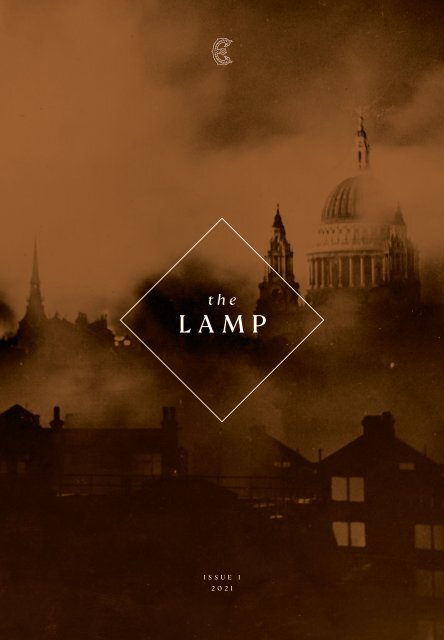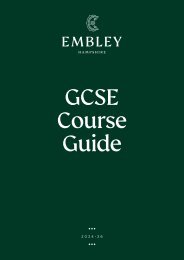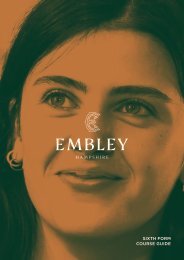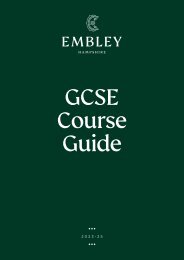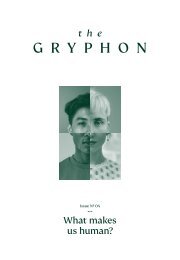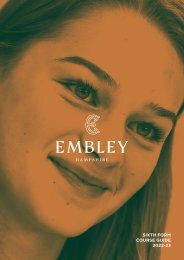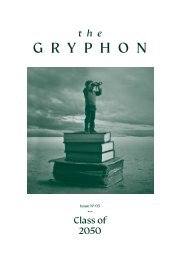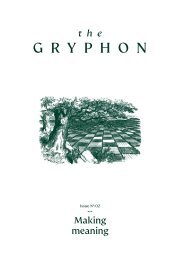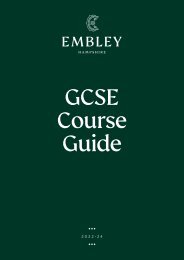The Lamp - Embley's Annual Creative Writing Magazine (issue 1)
You also want an ePaper? Increase the reach of your titles
YUMPU automatically turns print PDFs into web optimized ePapers that Google loves.
the<br />
LAMP<br />
ISSUE 1<br />
2021
“<br />
WRITING, TO<br />
ME, IS SIMPLY<br />
THINKING<br />
THROUGH MY<br />
FINGERS.<br />
”<br />
ISAAC ASIMOV
POETRY & PROSE<br />
Welcome to the first annual Embley<br />
creative writing magazine.<br />
Here we share with you some of the amazing writing created<br />
by Embley pupils across the last academic year; what you<br />
will see in the next few pages is a snapshot of a variety of English<br />
experiences at Embley: writing created in lessons and at home,<br />
often for the sheer pleasure of composing; entries for competitions,<br />
held across the school; writing for co-curricular activities and<br />
things that were created just because the mood was there.<br />
I suppose what they have in common is the right stimulus provided,<br />
followed the time and space to write, Virginia Woolf’s room of one’s<br />
own. <strong>The</strong> quality of what you will see here is a testament to the creativity<br />
of the school, which provides both stimulus and space to write for us all.<br />
We have a variety of incredible poems, as well a lot of extremely<br />
impressive prose. Sometimes, they are based on very strict criteria,<br />
such as a sonnet, or a close modern parody of a particular writer,<br />
but often they have no direct link to anything and perhaps that is<br />
the most impressive of all: the creative instinct, almost independent<br />
even of the mind in which it grows. Romantic poets would have seen<br />
it as a divine message and maybe they were not far from the truth.<br />
I hope you will enjoy what you read here; it has certainly been a<br />
pleasure finding and presenting this amazing work in what was a<br />
trying and yet extremely successful and productive Embley year.<br />
In sharing this, we hope it will also provide inspiration to our pupils<br />
for the year ahead.<br />
Steve Bowyer<br />
Head of English<br />
1
POETRY<br />
ROMANTIC POETRY<br />
Romantic poetry is a unit of study at GCSE. To provide<br />
inspiration, pupils spend lessons exploring the beauty of<br />
Embley’s glade, the Long Walk and Heather Gardens in the Spring.<br />
ONE SUMMER EVENING<br />
A summer evening, the daffodils smiled at the sun.<br />
Swans swam out through the lake. <strong>The</strong> sun shone upon me,<br />
the trees of love that reached above the bright blue sky.<br />
<strong>The</strong> days with rain are romantic and the moon’s silver kiss<br />
A crown of golden daffodils beside the stream,<br />
beneath the trees, dancing in the breeze.<br />
<strong>The</strong> rainbow shone with colours like my heart,<br />
that burst with vibrancy<br />
Under a roof of stars jasmine flowers and<br />
sunshine sunflowers, with climbing grape vines<br />
grew up the walls of a grand garden.<br />
<strong>The</strong> roar of the ocean holds secrets, as love rises with the tides<br />
And sits on the crest of the wave.<br />
Flowers of gold<br />
Who knows what they behold?<br />
<strong>The</strong> rain sprinkles the flowers<br />
Water droplets hang like crystals<br />
So different and blissful.<br />
Here, Charlotte’s piece is particularly evocative, capturing what<br />
the best Romantic poets do: the link between natural objects,<br />
the weather and human emotion.<br />
2
POETRY<br />
Amy’s Romantic poem was also very impressive, borrowing<br />
ideas from Wordsworth’s famous ‘Daffodils’ and Exposure by<br />
Wilfred Owen, which we had studied in class.<br />
A CROWD<br />
OF ROSES<br />
A crowd of roses lay beside the lake,<br />
<strong>The</strong>y basked in the golden sun,<br />
<strong>The</strong>ir red petals curled in the heat,<br />
A slight breeze blew by,<br />
It danced off their crimson skin.<br />
<strong>The</strong> clouds above them curtsied across the sky;<br />
<strong>The</strong>y lay in peaceful bliss,<br />
Watching the lazy days go by<br />
<strong>The</strong> water waited in desperate fear,<br />
A red army stood by,<br />
<strong>The</strong>ir thorny arrows may soon be shot,<br />
And pierce the water’s shallow skin.<br />
A hurricane erupted in the once calm sky,<br />
It dragged the water towards the bank,<br />
But the patient red army still stood by<br />
Watching its prey with mighty hunger.<br />
Suddenly the sky calmed,<br />
Releasing its tight grip.<br />
<strong>The</strong> water drifted home, order was restored;<br />
<strong>The</strong> water lay back in a moment of relief,<br />
<strong>The</strong> clouds huddled in recovery<br />
Travelling across the pale blue sky.<br />
<strong>The</strong> short-lived battled was over,<br />
But the war waited by.<br />
3
Year 7 pupils<br />
composed pieces of<br />
poetry about war as part<br />
of a competition to<br />
celebrate National<br />
Poetry Day. Isla’s poem<br />
describes wartime from<br />
the perspective of a<br />
civilian and was also read<br />
during Embley’s<br />
Remembrance Service.<br />
4
POETRY<br />
THE AIR RAIDS<br />
A WARTIME POEM<br />
<strong>The</strong> screaming has stopped, the city is silent<br />
I can see the light but I don’t want to look.<br />
We wait and we wait until we know it is safe;<br />
<strong>The</strong>n the sound of worried voices begins to arise,<br />
Floods of people start heading outside.<br />
As we step outside it is a horrible sight, <br />
Destroyed buildings and piles of ash <br />
How did they do so much in one night? <br />
Ambulances going this way and that.<br />
<strong>The</strong> screaming has stopped, the city is silent,<br />
I don’t like the air raids, We have to leave the flat;<br />
Mamma says I’m a brave girl. but the shelter is dark and<br />
scary Filled with rats I’m glad the screaming has stopped.<br />
<strong>The</strong> city is finally silent.<br />
5
POETRY<br />
A T R I O<br />
OF SONNETS<br />
As part of our celebration of Shakespeare<br />
Week, we held a Sonnet Competition and<br />
were amazed by the quality of entries from pupils<br />
across the Senior School and Sixth Form who<br />
mastered the intricacies of iambic pentameter,<br />
the rhyming couplet, alternative rhyme and the<br />
volta. Here is a selection of entries.<br />
I liken it to a sweet summer breeze,<br />
Calmly brushing swiftly through the trees.<br />
A feeling warm and soft onto my face,<br />
My feet feel grounded, staying in their place.<br />
Tweets of birds lullaby through the air,<br />
<strong>The</strong> harsh sun beaming with a stare.<br />
To any on goer briskly passing by,<br />
Would take a moment to look into the sky.<br />
Appreciate the beauty and the grace,<br />
Of nature’s doing, whilst sunbeams play on their face.<br />
This feeling of summer, heat basking whilst you stay,<br />
Laying in a chair, not a penny to pay.<br />
Nothing for this feeling, so rare, true and raw,<br />
Nothing at all, not a single outstanding flaw.<br />
By Lexi, using rhythm perfectly while introducing a neat, modern tone.<br />
6
POETRY<br />
<strong>The</strong> rain falls down like a stream through the way,<br />
Painted in a gallery on display,<br />
You promised me thy colour shall not fade,<br />
But the storm stole it and I was betrayed.<br />
Soaking through my unbreakable feeling,<br />
My instinct needs lots of healing,<br />
However, my memories are taking over,<br />
I wish I was lucky like a 4 leafed clover,<br />
I watched you play happily in the fields,<br />
Now your happiness is blocked with shields,<br />
Yet you come to see me soon,<br />
As we stargaze, looking at the moon,<br />
You make everything so much fun,<br />
Now my sorrows are undone.<br />
By Paige, borrowing from Shakespeare’s<br />
‘Shall I compare thee to a summer’s day’, while taking something<br />
of the natural colouring of John Clare, the Romantic sonneteer.<br />
Shall I compare you to a summer’s day?<br />
Nay, you are much brighter and funnier!<br />
Facts and knowledge do spring from you like rays<br />
And commendations flood in from teachers.<br />
Often are you on iPads to be found,<br />
Watching YouTube or chatting to your friends,<br />
Doing art, even playing in the grounds,<br />
Diligent study til the school day ends.<br />
Oh the mouth-watering food baked weekly<br />
Oh the fun had in music and drama<br />
Completing fair English tasks uniquely<br />
Now in school and not home with your llama!<br />
Such talent and kindness is rare to find<br />
What a great group of people is combined!<br />
A tribute by Ms Swann to her tutor group, bringing a<br />
lovely sense of joy in her description of the pupils.<br />
7
POETRY<br />
LOOKING<br />
OUT OF MY<br />
WINDOW<br />
A PANDEMIC POEM<br />
12 8
POETRY<br />
Sometimes the best literature is spontaneous, a celebration<br />
of the moment. Ellen takes a moment in time with this<br />
exquisitely well devised poem about the pandemic.<br />
Looking out of my window<br />
I see, birch trees, birds and bees.<br />
<strong>The</strong> sun is setting, the clouds are<br />
gazing down on us, the neighbour’s<br />
cats are fast asleep indoors.<br />
Pigeons roam the ground, droopy<br />
flowers sway, unhappy.<br />
<strong>The</strong> world doesn’t feel right at<br />
this moment in time. Nothing is <br />
growing, the grass isn’t happy,<br />
even the sun has lost his smile.<br />
And all the time we’ve been<br />
locked indoors, the vegetables<br />
haven’t grown. Nor has the birch<br />
tree that sits by my bedroom<br />
window.<br />
Although we may be grumpy<br />
and tired and in vain,<br />
I’m sure the sun will rise again<br />
(followed by rain). And after<br />
the pandemic is over, we can<br />
gaze down from our windows<br />
and think ‘Aaah - isn’t the world<br />
lovely and peaceful<br />
at this moment in time.’<br />
Looking out from my window<br />
I will see, summer roses and<br />
strawberries and sweet wafts<br />
of fresh air.<br />
And the world - for once -<br />
will feel normal again.<br />
Right up until a hailstorm<br />
brings us back to reality.<br />
9
SHORT STORIES<br />
A 21 ST C E N T U R Y<br />
CHRISTMAS CAROL<br />
Isaac adapts a Dickens’ classic, providing quicky modern<br />
touches and a contemporary edge for his entry into our<br />
Christmas <strong>Writing</strong> Competition.<br />
Oh! But he was a greedy beast.<br />
He made his employees work for far below the minimum wage, snatching<br />
their lives to make more money for himself. He was a driven, aggressive,<br />
hateful, cold, feared old miser! Compared to his brutal work regimen,<br />
the infamous sweatshops with exploited child-workers were attractive<br />
workplaces. Amazon.com and its tales of bullied, exhausted employees<br />
was a positive Eden! Scrooge was stone cold throughout – devoid of<br />
warm emotions. Lonely (by choice) and secretive, the hatefulness inside<br />
him – that he released in his anonymous, troll comments on social media<br />
pages against his competitors – was shown on his face. <strong>The</strong> vulnerable<br />
elderly were his prime victims; they feared his random calls threatening<br />
them with a virus in order to extort their hard-earned pensions.<br />
Dementors were cute and cuddly in comparison. <strong>The</strong> coldness within<br />
him was mirrored on his exterior frostiness: his face was pinched and<br />
wrinkled, his voice was harsh and he walked as if he were held upright by<br />
icicles. Even his thinning hair looked like strands of ice, which continued<br />
onto his eyebrows and chin. An aura of coldness was permanently with<br />
him and, even at the height of Summer, he emanated that coldness.<br />
Christmas – traditionally a time of inner warmth and happiness for<br />
humankind – merely increased his iciness to all.<br />
No one ever engaged him in conversation. Rough sleepers knew better<br />
than to beg from him. Children and adults avoided him in the street.<br />
Even guide dogs were frightened, turning tail and dragging their blind<br />
owners away from his reddened glare. Even the dreaded Coronavirus<br />
was fearful of encountering him. In fact, he was worse than COVID-19,<br />
for no vaccine could ever inject warmth into him.for no vaccine could<br />
ever inject warmth into him.<br />
10
But<br />
Scrooge<br />
didn’t<br />
care!<br />
On Christmas Eve – his least favourite day of the year because it was the<br />
happiest for good caring people – Scrooge gazed down from his narrow,<br />
unheated office at the top of the soaring Scrooge Tower, enjoying the<br />
effects of the biting winds and freezing fog upon the crowds below.<br />
He sneered at the seething masses as he thought of how his latest<br />
campaign to prevent money being thrown away had just succeeded.<br />
He had stopped that ridiculous footballer Rashford’s mission to give<br />
free meals to deprived children. Now, if only he could claw back that<br />
£33 million raised by that old soldier with a walking frame…<br />
His blue lips almost parted in a rictus smile at the eco-friendly lights<br />
battling feebly against the polluted air which was invading every<br />
single area. So much for the Xtinction rebels; the brown, sticky fog was<br />
controlled by Scrooge’s wintry brother, Nature! <strong>The</strong> coldness increased<br />
as below him his workers beavered away anxiously, even though it was<br />
3 o’clock in the afternoon of Christmas Eve.<br />
11
SHORT STORIES<br />
EMILY<br />
WASN’T<br />
LISTENING<br />
Year 8 pupils study dystopian<br />
fiction, the work of George Orwell,<br />
Ray Bradbury and Aldous Huxley,<br />
alongside more contemporary novels<br />
and theory about why people are still<br />
intrigued by the idea of the world<br />
going wrong. In the opening of a<br />
dystopic novel below, the way Hannah<br />
intertwines setting, character detail<br />
and a sense of hopelessness<br />
and oppression is masterful.<br />
12
SHORT STORIES<br />
Emily wasn’t listening. <strong>The</strong> chaotic classroom<br />
was a whirlwind of screams, laughter and<br />
wasted education, that only the rich could<br />
afford. But it wasn’t chewing gum or the<br />
throwing of pencils that was distracting her; it<br />
was the streets. <strong>The</strong>y were completely, utterly<br />
empty. It was a stark contrast to their usually<br />
overcrowded market town, and she hated it.<br />
It made the town seem colder, harsher and<br />
lonelier. Not a single person had dared to leave<br />
their house that morning. <strong>The</strong>y all knew the<br />
Crew were coming.<br />
Outside, the last of the autumn leaves were<br />
cascading down, slowly and miserably, like a<br />
child that finally gave in to leaving a friend’s<br />
house. Ice lined the pavement and, as I<br />
glanced over, it gave me a frosty wink, telling<br />
me that I’d be the next unlucky pedestrian to<br />
slip precariously into its grasp. <strong>The</strong> towering<br />
apartments that provided life saving shelter to<br />
many, were so close to the school, that it felt<br />
like they could all get crushed by this giant in<br />
an instant. <strong>The</strong> cracked glass in the very few<br />
windows, reminded Emily that even money<br />
couldn’t buy the resources they no longer<br />
had. Healthcare and food supplies were at an<br />
all-time low. Since the ghost flu had infected<br />
thousands of citizens living in the Jurius region<br />
of South Paria, the Crew saw this as a solution<br />
to the rebellions. <strong>The</strong>ir logic was this: the more<br />
people die, the smaller an army there would<br />
be to annihilate. Only government officials<br />
had access to the life-sustaining medicine that<br />
everybody craved.<br />
Shocked, Emily jumped up suddenly as the<br />
bell gave a piercing shriek, alerting her that<br />
school was over, and she faced the treacherous<br />
journey home. Wearily, she collected a few,<br />
precious belongings and placed them carefully<br />
into her threadbare bag. As she was fastening<br />
her bag straps together with a safety pin, she<br />
noticed something at the bottom of the bag.<br />
Her heart skipped a beat as she realised what<br />
it was – a tattered old picture, but not just any<br />
picture, oh no, this one was symbolic, but also<br />
worth thousands in the eyes of many. It was<br />
her home. Her real home. A huge colourful<br />
paradise, full of her favourite things, back in the<br />
days when money really could buy happiness.<br />
Back when Earth was a sweet, blissful place to<br />
live. Back, before the disaster that destroyed<br />
the world struck.<br />
Snapping back to reality, she weaved her<br />
way through the bustling corridors. Her brain<br />
seemed to ignore the enormous number of<br />
students heaving their way past; never before<br />
had she felt so alone. She shouldered her way<br />
through the stampede and pushed through the<br />
cold, metal gates, leaving the lifeless building<br />
behind her. She grasped the collar of her<br />
useless, thin coat and pulled it all the way up to<br />
her ears, in a desperate attempt to keep away<br />
the coldness of reality. <strong>The</strong> repeated glances<br />
over each shoulder only made her war against<br />
the climate harder to fight. <strong>The</strong> cameras stared<br />
down from every corner, like seagulls eyeing a<br />
child’s ice cream. <strong>The</strong> desolation in the town<br />
echoed through her soul, a singer wailing into a<br />
microphone. But it wasn’t just the cameras that<br />
were a danger to her; momentarily she allowed<br />
her mind to wander back to the warmth and<br />
comfort of her previous life. Her stomach gave<br />
a jolt. She was falling. Fast.<br />
As she opened her eyes she glanced around.<br />
With no idea as to what had happened, she<br />
leaned up and placed her hands beside her. As<br />
she did, she felt a strange tingling sensation.<br />
<strong>The</strong> lump underneath her arm, ghostly arm<br />
itched.<br />
She was going to die.<br />
She didn’t doubt that.<br />
13
SHORT STORIES<br />
THE GOVERNESS<br />
Year 9 pupils study Gothic writing and to<br />
provide inspiration, they explore the Manor<br />
House as part of the renowned ‘Embley Gothic<br />
Trail’. Eloise has written this beautifully wellconstructed<br />
opening to her short story.<br />
14
Mary was dead; there was no doubt<br />
about it. Her shiny skin was pale and<br />
grey, her lips were a mottled shade of blue. A<br />
river of crimson blood seeped from her chest<br />
and stained the cloth apron that she wore.<br />
She was dead and I did it.<br />
Let me start from the beginning.<br />
Birds sang a sweet melody as the old pony<br />
and trap rattled down the lane. Men worked<br />
in the fields, shouting out to one another and<br />
laughing with the joy of the land. <strong>The</strong> sun<br />
shone high in the sky and it was roasting hot,<br />
but I shivered. I had never been this far out<br />
of town before and I missed the hustle and<br />
bustle of London. We stopped abruptly; the<br />
lane was now silent apart from the hush of<br />
wind in the trees.<br />
“Out!” <strong>The</strong> driver dumped my suitcase on the<br />
floor. “Just down there to the right, you’ll see<br />
the house.”<br />
“But…”<br />
Before I could speak, he clucked to his old<br />
pony and trotted off down the lane, leaving a<br />
cloud of dust behind.<br />
Now I was alone in the vast countryside. Two<br />
vast statues stood on either side of the iron<br />
gates before me, their lion mouths frozen<br />
open in an immense growl. ‘Bickley Manor’,<br />
the sign read; so this was the place. I pushed<br />
open the gates and they screeched with rust<br />
and disuse. My suitcase trundled behind me,<br />
tumbling on every stone. <strong>The</strong> large driveway<br />
curled through the picturesque landscape,<br />
lined with ancient chestnut trees and a small,<br />
abandoned gatekeeper’s hut stood in the<br />
opening to a dense forest. I couldn’t see<br />
the house, but I could tell it would be grand,<br />
because of the size of the estate.<br />
I rounded another corner and there it was,<br />
the Manor House. It was a huge house, but<br />
entirely in proportion to its surroundings.<br />
Large windows glistened in the evening<br />
sun and a trickling water fountain soothed<br />
me: I was excited to start a new life in this<br />
house, my new home. It stood before me,<br />
in a maze of well-kept gardens, with a small<br />
vegetable patch in front of the chapel on<br />
the east side of the building. Colossal trees<br />
towered high above the intricate façade of<br />
the house; double wooden doors, guarded<br />
by substantial pillars opened slowly and a<br />
small, plump face peaked out.<br />
“Mrs Grosvenor?” I enquired.<br />
“Juliet! We have been expecting you – how<br />
wonderful it is to see you!”<br />
She wrapped me in a cosy embrace; although<br />
I had never met this woman before, the<br />
warmth of her welcome made me feel that<br />
this was where I belonged. At this moment,<br />
I thought that life was as perfect as it could<br />
be; the evening sun shone on my neck and<br />
my hair lifted in the gentle breeze. I felt so<br />
welcomed by this stranger, who seemed so<br />
pleased to see me.<br />
A Mrs Grosvenor stepped back, I managed<br />
to get a better look at her. She had curly,<br />
auburn hair, swept back in a neat bun and<br />
she was wearing a blue dress with a frilly<br />
apron. She was a plump woman, with wise<br />
eyes; maybe she was 30, maybe she was 50,<br />
it was difficult to tell.<br />
“I felt as if I didn’t introduce myself properly!<br />
I am Mary Grosvenor, but you can call me<br />
Mary,” she said “and this is Audrey.”<br />
A little girl poked her head out from behind<br />
Mary and waved.<br />
“I am eight years old,” she said proudly.<br />
“It is very nice to meet you, Audrey,” I said.<br />
I thought that this must be the small girl for<br />
whom I would be governess. She seemed<br />
angelic, so why had I felt so nervous before?<br />
Everything seemed ideal - who would know I<br />
could be so wrong?<br />
15
SHORT STORIES<br />
I ’ M S T I L L<br />
ANNA GLASS<br />
In the Summer Term, our GCSE and A Level pupils<br />
were asked to create a story which was submitted as<br />
one of the five strands of evidence which combined<br />
to create a bank of work to be used as exams were<br />
replaced with our assessment procedures.<br />
16
<strong>The</strong> sweet scent of cinnamon swirled<br />
up my nostrils, calming them. It<br />
reminds me of childhood; Christmas<br />
cookies with Grandma and coffee shop<br />
trips, in which 6-year-old me was so<br />
unbelievably fascinated by the whooshes<br />
and the whirs of the gleaming machines.<br />
And yet here, 15 years later and 5000<br />
miles away, as I amble aimlessly through<br />
the market, the smell still makes my mouth<br />
water. I swallow, reminding myself that<br />
reminiscing about the past won’t help me<br />
to start afresh.<br />
I just want to be lost – so I take every<br />
20-foot-wide twist and turn. I practically<br />
dance across the cobblestones, constantly<br />
making sure that the scarf wrapped<br />
to conceal my hair and the oversized,<br />
blacked-out sunglasses don’t slip off, for I<br />
may be allowing myself to have fun, but it<br />
will eve the death of me if I lose my cover.<br />
Perhaps literally.<br />
<strong>The</strong> market that I stumble upon in this<br />
foreign country could be an alternate<br />
universe, for the beauty of the people and<br />
the size of the fruits is beyond anything<br />
I’ve seen on this earth before. Lemons<br />
practically the size of my head sparkle in the<br />
hot Southern sun, sharing a cosy bed with<br />
oranges and pineapples and partnered<br />
with other fruit-like objects that had only<br />
ever appeared in my fantasies. Huge and<br />
multi-coloured and spiky and smooth and<br />
round and long and – oh my God – furry?<br />
I make a mental note to come back to this<br />
stall later, when the bearded man working<br />
there has stopped pummelling a tattooed<br />
fist into the back of a scrawny little boy.<br />
He can be no older than I must’ve been<br />
in my memory that this sight can’t help<br />
but bring back. I watch, feverishly as the<br />
child screams out, helpless, as he reaches<br />
his arm out desperately towards me.<br />
When his pleading eyes lock into mine,<br />
for a minute I feel as though I can see his<br />
soul, deep behind walnut irises there is<br />
a tiny lion cub. It has the appearance of<br />
such mighty potential; he could be proud<br />
and strong, king of the jungle and hero of<br />
the herd. But this lion cub cowers in the<br />
corner. Hi mane untamed, his tail between<br />
his legs, his spirit broken. A lump forms<br />
in my throat and my heart begins to<br />
heave, and I have no choice, but to leave.<br />
I wipe behind my sunglasses, expecting<br />
moisture, but my hand comes away dry .<br />
<strong>The</strong> realisation angers me: I’ve grown to<br />
be so hard-hearted that even witnessing<br />
the punishment of a child won’t reconcile<br />
with me. I adjust my scarf, then scurry<br />
away – like a meek little mouse when<br />
faced by a predator.<br />
I can’t help wondering as I wander along,<br />
with each step I take, I think of each swing<br />
the man took to the boy’s back. With<br />
each breath I draw, I hear the stallkeeper’s<br />
shouts breaking the softly buzzing air<br />
again, like the harsh crack of a whip and<br />
try to imagine what he was saying in<br />
English. Inhale.<br />
“You mustn’t steal!” Exhale.<br />
“Street rate!” Inhale.<br />
“You’re a disappointment to me and your<br />
mother.” (Wait...what?) Exhale.<br />
“I don’t care if she’s dead, she still hates<br />
you.” Suddenly, I’m alert.<br />
“Stop crying, you stupid brat!”<br />
I flinch, confused and afraid.<br />
“Jesus, Anna, I told you to stop your<br />
stupid crying!”<br />
<strong>The</strong> churn in my stomach and fazing<br />
over of my eyes tells me it’s happening<br />
again, but this time, I can’t control it. <strong>The</strong><br />
memories come as a flood; as if to wash<br />
away all the hard work, as if none of it<br />
matters, as long as I’m still Anna Glass.<br />
21 17
BOOK REVIEW<br />
TONI MORRISON’S<br />
THE BLUEST EYE<br />
As part of our celebrations of World Book Day, to celebrate<br />
this international festival, we held a Book Review Competition.<br />
<strong>The</strong>re were many entries, from all ages, some highly entertaining<br />
video recordings, as well as the more conventional review.<br />
Charlotte, a Sixth Form English Literature student impressed<br />
the judges with her critique of this book.<br />
Toni Morrison has such a way with words<br />
that she has the ability to completely<br />
immerse the reader. <strong>The</strong>re is a chilling<br />
beauty in the way she constructs her novels.<br />
However, ‘<strong>The</strong> Bluest Eye’ is extremely<br />
poignant, as it enlightens the reader of the<br />
cruel realities of a young girl called Pecola’s<br />
life. Her character is shrouded in mystery,<br />
and you never fully understand how she<br />
feels.<br />
‘It was their contempt for their own blackness<br />
that gave the first insult its teeth.’ Morrison<br />
depicts the warped image of beauty and<br />
communicates how it has affected many<br />
young black girls.<br />
This novel opened my eyes to <strong>issue</strong>s that<br />
have never personally influenced me, but<br />
Morrison’s novel left me feeling melancholy<br />
and in awe of the way she communicated<br />
her message.<br />
<strong>The</strong> abuse she faces from classmates and her<br />
family, forces her to escape into a fantasy;<br />
she dreams of having blue eyes.<br />
<strong>The</strong> novel touches on some very harrowing<br />
themes, including abuse and the internalised<br />
white beauty standards which damage the<br />
lives of many black girls and women.<br />
Morrison is an incredible author and all of her<br />
novels that I have read have had a profound<br />
impact on me. <strong>The</strong>y can be unsettling and<br />
uncomfortable, but they are thoroughly<br />
enigmatic and immersive.<br />
18
NEWSPAPER ARTICLES<br />
FULFILLING A CHILDHOOD DREAM<br />
Our GCSE academic scholars were asked to write a piece in the<br />
style of a newspaper article about what made them unique. Niamh<br />
explores the world of competitive ski racing while Chloe describes<br />
her childhood dream of becoming an international show jumper.<br />
A COMPETITIVE SKIER<br />
Ski racing is not a sport that many people really know much about.<br />
Many people see it as ‘just going down the hill fast’.<br />
In fact, there is a whole lifestyle that can be experienced from a young<br />
age, including a tremendous amount of dedication and hard work.<br />
For World Cup athletes, it is all about preparation, as they will push their<br />
bodies to the limits, as they want to win. With only the top 10 races<br />
scoring points and money, it really is a gruelling sport.<br />
Race days come around often; some younger athletes can cover up to<br />
three continents in a few weeks, to try and lower their points as much as<br />
possible.<br />
As well as the skiing training, physical fitness and even mental fitness<br />
really separates those who win and those who don’t. With top athletes<br />
having extreme fitness programmes, as well as having the need to<br />
balance their work and social life, it can definitely be tough.<br />
On race days, it really shows who truly wants it, as many athletes can<br />
psych themselves out before the race even starts, due to nerves and<br />
stress. Many will also go on to crash out or have equipment malfunctions,<br />
causing injuries that sometimes even end their careers as ski racers.<br />
For younger athletes, they still have the same kind of programmes as<br />
World Cup athletes, just with less pressure and with the races having less<br />
significance, although the potential that they want to have, causes them<br />
to treat the races as if they were the World Cup. Each individual has their<br />
own race day routines, preparing themselves to win.<br />
Ski racing is one of those sports that people are deceived by. It isn’t<br />
just going as fast as you can, it is about the commitment and training,<br />
showing to people that, those you want to win the most, often do.<br />
19
NEWSPAPER ARTICLES<br />
INTERNATIONAL<br />
SHOW JUMPER<br />
When I was three, I wanted to be an<br />
international show jumper. Now I am<br />
14, I am almost there!<br />
Show jumping as a sport involves a lot of<br />
travelling. Almost every weekend we are<br />
competing nationally around the country,<br />
at various different venues. No show is the<br />
same; you will never jump the same course<br />
twice. This is what I like about it, as you<br />
face new challenges all the time, testing<br />
yourself and your horse’s abilities and<br />
seeing if the long hours of training have<br />
paid off.<br />
Like any other sport, you have<br />
ups and downs all the time.<br />
One minute you are winning a<br />
big championship and the next day,<br />
you could have a fence down, or<br />
even fall off. Once I almost broke my<br />
jaw and neck – they know my name<br />
in A&E, I go there so often!<br />
Horses aren’t machines and no matter what<br />
you do, if your horse isn’t performing to its<br />
best ability on that day for whatever reason,<br />
whether they are not feeling well, unhappy<br />
or spooky, you can only do your best.<br />
You are bound to have a bad day at some<br />
point, even if it’s not your fault. I believe<br />
that show jumping teaches you to be more<br />
mature from a younger age.<br />
I started competing when I was 10 years<br />
old and I had good days, along with some<br />
bad days. <strong>The</strong> discipline teaches you how<br />
to deal with the good and the bad and<br />
to be a good sport. You learn to be more<br />
understanding and also to accept your<br />
mistakes, but not dwell on them and work<br />
to make yourself better.<br />
Training is the key to success in show<br />
jumping. I currently have two horses.<br />
Both of these horses have to be kept fit<br />
and on top form, ready to compete. This<br />
means training throughout the week,<br />
in preparation for competitions at the<br />
weekends.<br />
I personally love training my younger<br />
horse, Grace, because when she starts to<br />
go well and I get good results, it gives me<br />
the best feeling. I also love training on my<br />
older horse, Fully, because she helps me,<br />
when I get things wrong and helps correct<br />
them.<br />
Show jumping is a very difficult<br />
sport in many ways. It is physically<br />
exhausting, although a lot of<br />
people believe that as horse<br />
riders, we ‘just sit there’. We do<br />
have a much larger role than<br />
that. We have to hold everything<br />
together and maintain a balanced rhythm,<br />
to allow the horse lift their knees to jump<br />
and a lot more.<br />
Show jumping is also very tiring. <strong>The</strong>re<br />
are early mornings and late nights, when<br />
competing at the weekends. One weekend,<br />
I woke up at 4am, to get to the yard at<br />
4:30am, to leave in the lorry with the horses<br />
at 5am. My class started at 8am and my last<br />
class ended at 4:30pm and I got home at<br />
7:30pm.<br />
I love this sport, partly because it’s not<br />
easy. It really shows when you have put in<br />
the hard work and it feels amazing when<br />
it does go right. And that makes it all feel<br />
worthwhile.<br />
20
<strong>The</strong> following poem is the inspiration for the<br />
title of our <strong>Creative</strong> <strong>Writing</strong> publication.<br />
SANTA FILOMENA<br />
Whene’er a noble deed is wrought<br />
Whene’er is spoken a noble thought<br />
Our hearts, in glad surprise,<br />
To higher levels rise.<br />
<strong>The</strong> tidal wave of deeper souls<br />
Into our inmost being rolls,<br />
And lifts us unawares<br />
Out of all meaner cares.<br />
Honor to those whose words or deeds<br />
Thus help us in our daily needs,<br />
And by their overflow<br />
Raise us from what is low!<br />
Thus thought I, as by night I read<br />
Of all the great army of the dead,<br />
<strong>The</strong> trenches cold and damp,<br />
<strong>The</strong> starved and frozen camp, —<br />
<strong>The</strong> wounded from the battle-plain<br />
In dreary hospitals of pain,<br />
<strong>The</strong> cheerless corridors,<br />
<strong>The</strong> cold and stony floors.<br />
Lo! in that house of misery<br />
A lady with a lamp I see<br />
Pass through the glimmering of gloom<br />
And flit from room to room.<br />
And slow, as in a dream of bliss,<br />
<strong>The</strong> speechless sufferer turns to kiss<br />
Her shadow, as it falls<br />
Upon the darkening walls.<br />
As if a door in heaven should be<br />
Opened, and then closed suddenly,<br />
<strong>The</strong> vision came and went,<br />
<strong>The</strong> light shone and was spent.<br />
On England’s annals, through the long<br />
Hereafter of her speech and song,<br />
That light its rays shall cast<br />
From portals of the past.<br />
A lady with a lamp shall stand<br />
In the great history of the land,<br />
A noble type of good,<br />
Heroic womanhood.<br />
Nor even shall be wanting here<br />
<strong>The</strong> palm, the lily, and the spear,<br />
<strong>The</strong> symbols that of yore<br />
Saint Filomena bore.<br />
A Poem By<br />
Henry Wadsworth<br />
Longfellow
Embley Park, Romsey, Hampshire SO51 6ZE<br />
Main switchboard: +44 (0) 1794 512206<br />
Email: info@embley.org.uk<br />
www.embley.org.uk


